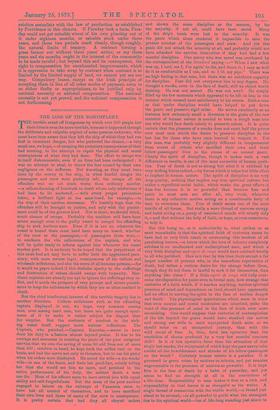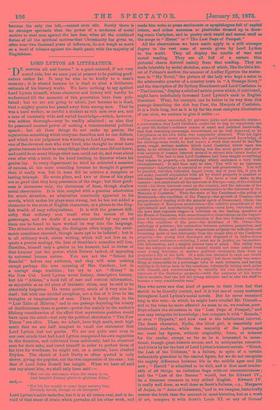THE LOSS OF THE NORTHFLEET.
THE terrible event off Dungeness by which over 300 people lost their lives is even the more terrible, because it happened through the deliberate and culpable neglect of some persons unknown, who must have been aware that they left the ship of which they had run fold in imminent danger, but who preferred the chance,—a very small one, we hope,—of escaping the pecuniary consequences of their bad steering, to the attempt to repair the physical and moral consequences of what they had done. The effort to escape was in itself dishonourable, even if no lives had been endangered ; it was an attempt to steal, to throw the loss caused by their own negligence on the sufferers. But knowing, as they must have done by the outcry in the ship, in what fearful danger the passengers and crew were probably left, the escape of the offenders was an act much worse than ordinary murder, —a callous dooming of hundreds to death whose only misfortune it had been to lie anchored, — with every proper precaution taken, a brilliant light at the mast-head, for example,—in the way of their careless steersmen. We heartily hope that the offenders will be brought to justice, and only wish the punish- ment could be of the gravest kind. Nor is there, we should think, much chance of escape. Probably the accident will have been severe enough even to the guilty vessel to compel the offending ship to seek harbour soon. Even if it is not so, wherever the vessel is bound there must hav6 been many on board, whether of the crew or the passengers,—if passengers there were,— to condemn the vile callousness of the captain, and who will be quite ready to inform against him whenever the vessel reaches port. It is certainly to be hoped that the perpetrator of this most foul act may have to suffer both the aggravated pecu- niary, with more serious legal, consequences of his callous and wholesale selfishness, and also the scorn of all humane persons,—for it would be grave indeed if this diabolic apathy to the sufferings and destruction of others should escape with impunity. Mer- chant captains are already too apt to ignore the sufferings they in- flict, and it needs the prospect of very prompt and severe punish- ment to keep the callousness by which they are so often marked in check.
But the chief intellectual interest of this terrible tragedy lies in another direction. Callous selfishness such as the offending -captain displayed is not, we hope, very common among
men, even among hard men, but there are quite enough speci- mens of it to make it rather subject for disgust than for surprise. But the contrasts of conduct in the sink- ing vessel itself suggest more curious reflections. The Captain, who perished,—Captain Knowles,—seems to have done his duty in a fashion almost beyond praise. It was to his courage and sternness in resisting the panic of the poor emigrant navvies that we owe the saving of some 90 odd lives out of more than 400 ; revolver in hand, he kept back the selfish rush on the boats, and had the nerve not only to threaten, but to use his pistol when his orders were disobeyed. He saved his wife—a six-weeks' wife—in one of the boats, and bade her good-bye, calmly telling her that she would see him no more, and perished in the active performance of his duty, the noblest death a man can die. Most of his officers seem to have served him with equal ability and self-forgetfulness. But the mass of the poor navvies engaged to labour on the railways of Tasmania seem to have lost all control of themselves, and to have sacrificed their own lives and those of many of the crew in consequence. It is pretty certain that had they all obeyed orders
and shown the same discipline as the seamen, by far the majority, if not all, could have been saved. Many of the ship's boats were lost in the anarchy. It was the panic which alone rendered it impossible to save the greater number of the passengers and crew. And yet this panic did not attack the minority at all, and probably would not have attacked the navvies themselves if they had had a few months' discipline. One navvy who was saved was overheard by the correspondent of the Standard saying :—" When I saw what was up, I said, sea I, I'm agoin' to die, and damn it, I may as well do it as comfortable as I can, and so I lit my pipe." There was no high feeling in that man, but there was an indefinite capacity for discipline. Fear did not overpower him in any degree. He thought a smoke, even in the face of death, still an object worth desiring. He was not seared. He was not awed. He simply filled up the few moments which appeared to be left to him in the manner which seemed most satisfactory to his senses. Such a man as that under discipline would have helped to put down the panic and preserve rigid order. He serves excellently as an instance how extremely small a diversion in the grain of the raw material of human nature is needed to turn a rough man into one who would face death calmly to preserve others. It is quite certain that the pleasure of a smoke does not exert half the power over most men which the desire to preserve discipline to the last has for those who have once learned to respect it. Yet this man, was probably very slightly different in temperament from scores, of others who sacrified their own and their fellow-passengers' lives in the excess of an animal panic. Clearly the spirit of discipline, though it makes such a vast difference in results, is one of the most accessible of human quali- ties. Fear of death is not so strong but what it is subdued by very trifling forces indeed, —by forces which it takes but little effort to implant in human nature. The spirit of discipline is no very deep quality, nothing that implies any true spiritual culture, but rather a superficial social habit, which works the great effects it does less because it is so powerful, than because fear and panic in most men are after all, very weak, whenever there is any collective motive acting on a considerable body of men to overcome them. Fear of death seems one of the most terrific of all forces. But really a mere thread of nervous energy and habit acting on a group of associated minds will utterly defy it,—and that without the help of faith, or hope, or even conscience, to help it.
But this being so, as it undoubtedly is, what strikes us as most remarkable is that the spiritual faith of centuries seems to have had so very little result in overcoming this weakest of all paralysing terrors,—a terror which the love of tobacco completely subdues in an uneducated and undisciplined man, and which a very little discipline and esprit de corps would have subdued wholly in all who perished. How is it that by this time there are not a far larger number of persons who, in the immediate expectation of death, feel rather a curious desire for the change before them, though they do not deem it lawful to seek it for themselves, than anything like alarm ? If a little esprit de corps will fully over- come the disposition for panic even in brutal men, how strange that centuries of a faith which, if it teaches anything, teaches spiritual presence of mind and dependence on God, should have apparently had no effect in nerving the spirit in the face of sudden danger and death ! The physiological speculations which seem to show that even mental and moral tendencies are inherited, make the want of this presence of mind in the face of death even more astonishing. One would suppose that centuries of contemplation of the life beyond the grave would have steadied our nerves and strung our wills to meet unexpected death more as we should enter on an unexpected journey, than with the wild recoil of fear. Is, then, faith lesa operative than the emulation of shame produced by a very few months' common
drill ? Is it of less operative force than the attraction of that single last smoke, the enjoyment of which kept the poor navvy calm amidst all the bewilderment and shrieks of his fellow-passengers on the wreck ? Certainly human nature is a paradox. It is governed in great crises by motives so minute, and yet remains ungovernable in the presence of motives so powerful. It is kept firm in the face of death by a habit of yesterday, and yet seems to find no strength at all in the convictions of a life-time. Responsibility to man makes it firm as a rock, and responsibility to God leaves it as changeful as the waves. A single thread of connection with the visible world,—a thread just about to be severed,—is all-powerful to guide what the strongest ties to the spiritual world—ties of life-long standing just about to become the only ties left,—cannot even stir. Surely there is no stranger spectacle than the power of a modicum of social motive to steel men against the last fear, when all the combined forces of all the spiritual motives that Christianity has given us, after near two thousand years of influence, do not weigh as much as a bowl of tobacco against the death panic with the majority of Englishmen.



































 Previous page
Previous page